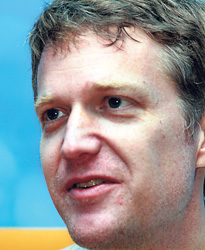Dr. Alan Ernst, PhD, gives the distinct impression of being something of a bright yet reluctant hero from a DC graphic novel. An expert on neuroscience by day and a talented jazz musician by night, this man, by his own admission, has been leading a double life since his college days. It’s hard to say if he’s a scientist or a professional musician. He clearly loves to talk about both science and music – with great gusto.
 |
| Alan Ernst |
“It’s good to have some balance in your life,” is how he justifies his nocturnal passion of losing himself in the rhythmic sounds of piano, bass, drums and a bit of woodwind.
Dr. Ernst was here on a lecture and group discussion on the neurological background of disabilities such as autism and Down’s syndrome organised by the Fulbright Alumni Association of Sri Lanka (FAASL) which was held on Friday at the United States-Sri Lanka Fulbright Commission Auditorium. That evening, he hit Park Street Mews, Colombo, for a solo piano performance followed by a jam session with local jazz artists. Talk about all in a day’s work.
“I’ve been playing for a long time, since childhood. I was trained to play Western Classical music and then at some point I felt I couldn’t make the classical music on the page come alive; I wanted to put more of my own interpretation into music and I think that’s why I got drawn to jazz, blues and improvisational music,” he says.
What, pray is improvisational music?
“You could think of it as composition in the moment. Spontaneous composition… Instead of writing out music on the score you’re creating music in the moment. There is a tricky balance to it,” he explains.
What this means is that he sits down at the piano and starts playing whatever comes to his head – on stage, with hundreds of people watching – and he has absolutely no idea what he’s going to play.
“Sure, it’s difficult. But I’ve done this a lot. It’s actually my favourite kind of music,” he insists.
Drawing inspiration from such celebrated greats in the jazz industry as Coltrane, Monk and Mingus, Dr. Ernst specialises in improvising and identifies himself as a pianist, although he plays the guitar and flute as well.
Getting back to Dr. Ernst’s ‘day job’, if you will, he holds a PhD in neuroscience from the University of Minnesota, USA and has post-doctoral research experience at the Harvard Medical School. His PhD was related to what is known as developmental neuroplasticity which, according to Dr. Ernst, is a complex discipline that studies the ability of the brain to physically and physiologically change in response to change in environment, practice or trauma.
“It’s been shown that in some musicians, like violin players, the part of the brain that controls their left hand, performing very complicated manouevres on the fretboard of the violin, is expanded more than other people’s. Because they put in so many hours of practice, you can actually see a change in the brain associated with practice. That’s kind of what neuroplasticity is. Now scientists are hoping to take that and help people with strokes and other kinds of brain damage and coax their brain to recover,” he explains.
How did he get into all this?
“I guess I’m very impressionable. I read some works by different neuroscientists and neurologists. A lot of the works by neurologist Oliver Sacks made a big impression on me,” he says, quite modestly.
As a scientist and gifted musician himself, does he feel that music too can help fight stress and bring normalcy to the lives of the differently abled ?
“I’m really interested in whether music can be used for therapy or for rehabilitation. We have also known all over the world that music is a stress buster and people like to dance and sing. But now we’re saying that it can help patients with Parkinson’s disease move with more typical rhythm to their movement.
Something about the rhythm of music helps release appropriate rhythm of movement. That wasn’t known before and people are starting to use it. They have been using it for a while, actually, with people with autism and other disabilities,” he says.
Dr. Ernst has worked for four years as the music director for the Interact Center for Performing Arts, a theatre group with disabled actors.
“All of the actors and performers had a disability of one kind or another – autism, Down’s syndrome, traumatic brain damage, schizophrenia, mental illness. We created a theatre together using improvisation to create theatre, collectively. We tended to use musical theatre and I think it was pretty profound,” he recounts.
As for integrating the differently abled, “I think there needs to be a revolution in how we look at people with disabilities and understand that you don’t need to be defined by your “disability”. It takes a change in consciousness. But if you have that change in consciousness, I don’t see any reason why there shouldn’t be help for folks with disability.
I don’t want to get too political but I think there are some differences I’ve observed in how people with disability are talked about or treated in the West vs. in some countries in Asia where I think often times disability is hidden away, and I don’t know what the reasons for that are. But I don’t think that helps, obviously to those with disability. So, I would hope that in the future there’s more consciousness raised,” he says.
Dr. Ernst is currently working on a Fulbright Commission grant in Nepal where he will reside till July, after which he will return to teaching medicine in the US.
|


